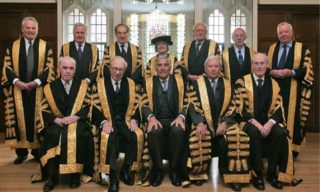
On December 5th the UK’s Supreme Court will hear the British government’s appeal against the astonishing ruling of the Divisional Court, part of the High Court, that it cannot act on the referendum result without Parliamentary sanction. The ruling was absurd on several levels, with respect.
For starters the Lord Chief Justice, Lord Thomas, should not have gone within a mile of the case. He is a founding member of the European Law Institute, which was set up to promote European legal integration. Clearly he should have recused himself, with respect. One of the other two judges, Sir Phillip Sales, is believed to favor British membership of the EU.
Sadly, the temptation to descend into the political arena proved too great. The judgment in the case, formally entitled Miller v. Secretary of State for Exiting the European Union, is junk law, with respect. As I see it, there are five major problems with it:
(1) It presumes that withdrawal from the Treaty on European Union (TEU) by the UK would alter domestic law. The government legal team, led by the Attorney-General, conceded this point, a major tactical error in my humble opinion, and all y’all know how humble I am. The European Communities Act 1972 (ECA72) expressly incorporates the TEU. Withdrawal from the treaty under Article 50 would not affect the ECA72. The act would need to be repealed before the TEU stopped being part of our law. Parts of Roman law still apply in Scotland more than 1,500 years after the collapse of the Western Empire.

(2) The court was not competent to rule on the exercise by ministers in the Queen’s Name of Her treaty-making powers under the Royal Prerogative. That was decided in the reign of Queen Victoria in the great case of Rustomjee v The Queen. It was also the approach of the courts in the Rees-Mogg case, which I started as junior counsel, along with my good friend, the late Leo Price QC, a fine lawyer.
That was a challenge to the infamous Maastricht Treaty, which ultimately doomed British membership of the EU, by overtly making the EEC a political union and creating the offensive concept of EU citizenship. The Europeans even claimed that that shameful treaty made Her Majesty a European Citizen, a claim which whilst constitutionally illiterate gave incredible offense in my country, reminding us of why we bombed the Ruhr.
(3) It is both illogical and indefensible for the courts to hold that the Royal Prerogative can be used to sign up for but not withdraw from EU treaties. It smacks of bias and “this is law because I say so” law, which is invariably bad law.
(4) The court treated Metric Martyr as rightly decided, when clearly it wasn’t. In that case, where I took first chair for the defense, the courts refused to uphold the great Weights and Measures Act 1985, the first time since we joined the EEC that Parliament had legislated in defiance of community law. Under the British Constitution a later Act of Parliament takes precedence over an earlier. Effectively the court, with respect, descended into the political arena and expressed a political preference, on legally indefensible grounds, for the ECA72 over the Weights and Measures Act. In so doing, they also expressed a political preference for the inferior French metric system over the superior British Imperial (foot-pound) system, and
(5) The court treated the Factortame case as rightly decided. That was the notorious case where the judges purported to ‘set aside’ the Merchant Shipping Act 1988, on the specious pretext, with respect, that it breached community law. It did, but so what? It was passed after the ECA72 and therefore took precedence over it. As the Solicitor-General of the day, Nick Lyell, a nice man with respect but a weak one, confirmed to me some years afterwards, the government took a political decision not to argue Implied Repeal, the basis of my argument in Metric Martyr.
_________
The Daily Mail Headline
Unsurprisingly, there has been a huge backlash against the judges after the Miller decision. In a famous headline the Daily Mail labeled them “Enemies of the People”. Anti-democratic forces seeking to undermine Brexit and anxious to keep Britain crushed under the German jackboot attacked the paper, to no avail. The Daily Mail stood their ground, and rightly so.
When judges descend into the political arena and start to play politics they are fair game, as the US Supreme Court found after its ridiculous decision in Roe v. Wade, where they effectively found that George Washington and Thomas Jefferson believed in abortion on demand. Of course there will be a political backlash against political decisions.
It will be many, many years before the British judiciary command the respect which they used to enjoy, even if the decision is over-turned.
_________
The Supreme Court
Britain is the only country in the world with three supreme courts. This nonsensical situation was brought about by liberals, firstly in the 19th century. Under German pressure they sought to abolish the House of Lords. They nearly succeeded. Thinking they would, they created a new Supreme Court of Judicature, with a Court of Appeal, which was intended to be the final court for England and Wales. They were already thinking of breaking up the United Kingdom, a strategic aim of Germany since the Potato Famine, so England and Scotland were to have separate final courts.
Thanks to the Tories the House of Lords was saved. However that left us lumbered with the Court of Appeal, which nobody wanted, except the judges appointed to it, of course, since the pay was better. Then the Blair government decided to set up another supreme court, to replace most of the judicial functions of the House of Lords. I gave written evidence to the select committee considering this idiotic idea and strongly opposed it.
Apart from anything else there was nowhere to put it. They ended up using the Middlesex Guildhall, a humble Crown Court, where as it happens I defended in my first jury trial (my client was triumphantly acquitted, I am pleased to say!). The learned trial judge by the way was a Labour MP, the late Peter Archer. He sat as a Recorder, a part-time judge. It wouldn’t have occurred to me invite him to recuse himself. Peter, a lovely man, was as nice as pie to me. A full-time judge would not have been any fairer, indeed probably less, since many of them are case-hardened and riddled with pro-prosecution bias.
What Tony Blair couldn’t do of course was abolish the highest court in the land, the High Court of Parliament. This exercises a supervisory jurisdiction over the Supreme Court, which may need to be used, if it acts unconstitutionally and refuses to allow the government’s appeal against an obviously wrong and unconstitutional decision.
This jurisdiction can be exercised in one of two ways. The judges of the Supreme Court can be removed from office by a simple resolution of both Houses of Parliament. Alternatively they can be tried at the Bar of Parliament under a Bill of Attainder and executed at the Tower of London (the usual venue for state executions).
There has no recent trial at Bar in England in recent years, but there is a comparatively recent precedent in Australia, where two impertinent journalists were very properly tried for being contemptuous of Parliament, although as an act of mercy the Federal Parliament did not sentence them to death.
Of course if you’re going to execute judges you have to treat them nicely – fresh straw in the dungeons, a slap-up breakfast on the morning of the big day and so on.
The usual mode of execution is decapitation by axe, as with his late Majesty King Charles 1. Traditionally, the condemned man is allowed to take a purse with him to the scaffold so that he can tip the executioner. Tipping the State Executioner is always a good idea, as otherwise you might get a second chop. You want to go for a single chop if you can.
The portents for the appeal are not good. The Supreme Court is busying itself granting leave to appear to every anti-Brexit body which is applying, including the Welsh and Scottish executives and, apparently, a trade union representing EU economic migrants.
The government’s legal team aren’t terribly good, frankly, and are a little out of their depth in a constitutional test case. The Attorney-General isn’t a particularly strong lawyer – obviously, since otherwise he would scarcely have been made Attorney-General. (The Chancellor of the Exchequer can barely add up, the Foreign Secretary doesn’t like foreigners and the Defence Secretary can’t shoot straight).
The Vienna Convention
The May government has only got itself to blame. Theresa May is a Remainer, who has yet to master the powerful intellectual and economic arguments in favour of Brexit. She dragged her kitten heels, with respect, on serving notice of withdrawal under Article 50. It should have been given within 24 hours of the referendum vote.
The delay has allowed the pro-German element to regroup, as it did after losing control of the government in 1940, eventually inviting the Deputy Führer to Britain to discuss a peace deal with Nazi Germany, as discussed last week. That coup failed however, after Churchill and the King got wind of it – both stood to lose their jobs, if not their lives, given that the Cabinet Secretary, Bridges, was a murderous thug, happy to go along with the mass-murder of the crew of dear old HMS Hood.
Theresa May never needed to go down the Article 50 route at all. She could simply have had Boris denounce the TEU under Part V of the Vienna Convention on the Law of Treaties.
The problem is that Mrs May still wants to be inside the EU’s customs union, i.e. still wants Britain to be a dumping ground for German exports. Since the Eastern European states want us to continue being a dumping ground for European labor and the European Parliament has a veto on any deal under Article 50, thankfully it is unlikely that this insane ambition will be realised.
As I predicted, the government is losing control of Brexit before the last of the leaves has fallen from the trees. It is not a question of when Europeans start to lose their lives – sadly, the first European economic migrants have already been murdered. Brexit is getting messy, but a peaceful, clean break with the EU is still the likeliest outcome. Happily, the European death toll is likely to remain low.
_________
A Fresh Point on MH17

I have been debating the issues surrounding the disgraceful Chinese shoot-down of MH17 with airline pilots and aviation experts in another forum. I thought that I had pretty much covered the bases on this, but a fresh point occurred to me when re-reviewing the CVR excerpts cited in the dodgy 2015 Dutch Safety Board (OVV) report.
It is common ground that Purser Mohd Gafar Bakar, poor man, was murdered in the cockpit of MH17. The OVV skates over this, just noting that that was where his body was found. Since they were pushing the single-missile theory they didn’t stop to analyse their findings, or maybe they did and didn’t like what they came up with.
Why was Purser Bakar in the cockpit? More to the point, why was his presence there not noted on the CVR tape? The recording stops just after 1320Z, which the OVV think is the Buk impact time. They also think it was a Russian Buk, which shows how much they know, with respect. Malaysian have pursers because they’re a properly run airline, which is another way of saying that they inherit their traditions from dear old BOAC.
The Purser wouldn’t have just wandered into the cockpit because he fancied a chat. He would normally go there because the captain had asked for him. On entering the cockpit he would most certainly greet the captain and the captain would most assuredly greet him, i.e. there would be a record of it.
Since the Purser’s presence in the cockpit cannot be reconciled with the CVR, it’s realistic to suppose that he entered the cockpit, bravely, after the captain and the avionics were taken out by the first, air-to-air, missile, and before the second missile, the Chinese Buk, hit. The location of the Purser’s body, i.e., supports the two-missile theory and undermines the single-missile theory, which was on its last legs anyway.
_________
My Reading This Week

This has included a lovely book of reminiscences from men who served aboard the great battleship HMS Ramillies, Battleship Ramillies: The Final Salvo, by Ian Johnston and Mick French (Seaforth, 2014). That nice man, with respect, HRH the Duke of Edinburgh wrote the foreword. Ramillies was his first ship, as a young Midshipman. You never forget your first ship.
It’s well worth a read, and gives a good account of life aboard a British battleship in two world wars. Ramillies was the first battleship to visit New Zealand, and her then captain was presented with a Maori grass skirt to wear into battle. Captain Middleton RN, her skipper during the D-Day bombardment, duly wore the grass skirt!
As Maori legend had foretold, the great ship came through D-Day unscathed, unlike our community partners the Wehrmacht on the other end of her mighty 15”/42 caliber main battery. Ramillies famously fired over 1,000 main battery rounds during the D-Day landings, killing lots of community partners.
Designed by the great naval architect Sir Tennyson d’Eyncourt, the Royal Sovereign class battleships were fine vessels. Good seaboats, albeit with a tendency to dive into waves rather than ride over them, they were stable gun platforms and highly maneuverable. With a good scheme of protection as well as a powerful main armament, they were the most powerful warships in the world when they entered service in World War I.
However, they were slower than the Queen Elizabeth class by a few knots. As I argue in Spyhunter they were good candidates for modernization. By World War II they badly needed a modern dual-purpose secondary battery, preferably 16 4.5” DP guns of the ‘between-decks’ type fitted to Queen Elizabeth and Valiant, increased main battery elevation, fully synthetic fire control, a more powerful AA fit and new high-pressure steam turbines. They could easily have steamed at 25 knots with 400 or 450 psi boilers.
As it was, HMS Ramillies gave valuable service throughout World War II. In 1941 she saved an entire convoy, HX106, from destruction by our community partners the battlecruisers Scharnhorst and Gneisenau. They saw her fighting top, the billowing clouds of smoke from her funnel as she bravely steamed towards them and her Battle Ensigns flying, turned and ran. They were wise to do so. They were not armored against 15” shell-fire.
_________
This Week’s Movie Review: Arrival (2016, dir. Denis Villeneuve)
Released to theaters last week in the UK and the week before Stateside, this is an intelligent movie, starring Amy Adams, Jeremy Renner and Forest Whitaker, so once again, it’s not one for Democrats. Not Clinton Democrats anyway.
I’m being a little unfair on my Democrat readers – one of these days I’ll review a movie suitable for Democrats, the Flintstones perhaps. As all y’all will know, it’s a sci-fi movie. The plot turns on the problems of communicating with aliens when they arrive, by which I mean ETs, not Mexicans, although of course they can also pose their own communication problems.
The language problem has been thought through, hence my comment that it’s an intelligent movie. It engaged my attention, although the folk sitting in front of me came out muttering that they couldn’t understand it. They may have been Liberal Democrats.
It’s not an action movie, and like all sci-fi movies except the Alien series, the aliens are a bit disappointing once you get to know them. The movie does ask some good questions however, like the how the hell do you communicate with an alien who doesn’t speak English? It also raises the issue of whether we can travel faster than light.
Of course we can – that idiot Einstein’s calculations were all over the shop. Whole galaxies are moving further away from Earth at faster than light speed, or at any rate they were billions of years ago, when the light left them. They might have slowed down a bit since. If a galaxy can move faster than light, then a starship certainly can. All you need is a civilisation advanced enough to harness fusion power, work out how to navigate interstellar space and find somewhere to pack the frozen food, i.e. a civilisation not governed by Democrats.
Arrival’s not for everyone, but I think most VT readers would enjoy it. It’s well-acted, the cinematography is very good and it’s more than just entertainment. I wouldn’t bet against it getting an Oscar or two.
Finally, may I wish my valued colleagues at VT, all my readers and their families a Happy Thanksgiving.
_______________

Michael Shrimpton was a barrister from his call to the Bar in London in 1983 until being disbarred in 2019 over a fraudulently obtained conviction. He is a specialist in National Security and Constitutional Law, Strategic Intelligence and Counter-terrorism. He is a former Adjunct Professor of Intelligence Studies at the American Military University.
Read Articles from Michael Shrimpton;
ATTENTION READERS
We See The World From All Sides and Want YOU To Be Fully InformedIn fact, intentional disinformation is a disgraceful scourge in media today. So to assuage any possible errant incorrect information posted herein, we strongly encourage you to seek corroboration from other non-VT sources before forming an educated opinion.
About VT - Policies & Disclosures - Comment Policy

![lady-liberty-scales-of-justice-h-1000[1]](https://www.veteranstodayarchives.com/wp-content/uploads/2015/02/lady-liberty-scales-of-justice-h-10001-320x220.jpg)




Comments are closed.